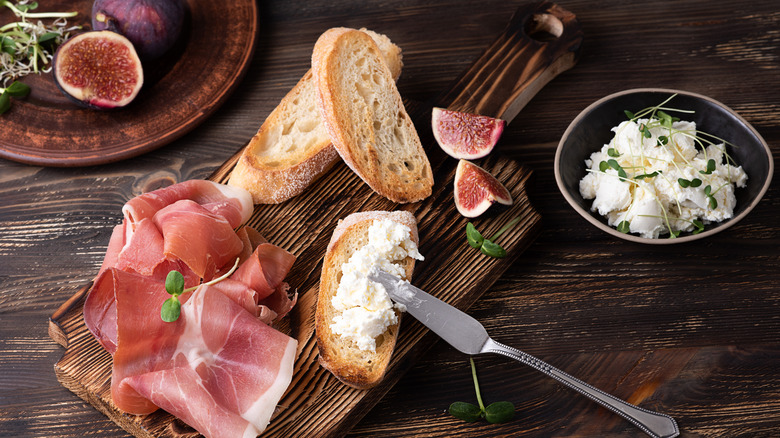Why Ricotta Cheese Is Best Paired With A Punchy Wine
If you love preparing Italian and Italian-American dishes, chances are you regularly stock your refrigerator with a tub of creamy ricotta cheese. Made from milk, salt, and an acidic ingredient, ricotta is similar to cottage cheese, featuring soft curds suspended in milky white liquid. Often showcased, of course, in a variety of Italian recipes — from classic baked ziti to stuffed ravioli to hearty sausage lasagna — ricotta's creamy mildness makes it a great choice for all kinds of other foods (via The Cheese Professor). These airy, sugar-dusted beignets are moistened by ricotta, for instance, and the cheese also provides a puffy, browned base for a bed of juicy red tomatoes in this savory tart using heirloom fruit.
If you enjoy not only serving (and eating) ricotta cheese, but also pairing it with wine, you might be looking for information on what type of vino, exactly, will complement the creamy white stuff. The answer? Something juicy and flavorful.
A punchy wine will complement ricotta's creaminess
As anyone who's ever hosted a wine and cheese night knows, pairing these delicious sippers with this tasty category of food isn't as easy as it might sound. Far more nuanced than just plopping a bottle of red or white on the table alongside a cheese board, pairing wine and cheese involves devoting some thought to the flavor and texture characteristics of the cheeses you're serving, and then selecting a vino whose style, sweetness level, and even country of origin best match those flavors and textures (via Wine Folly). So if you're serving a dish featuring ricotta — whether that's a creamy pasta or something simpler, like a crostini with a schmear of the stuff — you'll want to take the cheese's soft, creamy consistency and mild flavor into account when selecting a wine to pair with it.
Lucia Capretti, a Certified Specialist of Wine, recommends going for a punchy, flavorful wine to match with milky, lightly salted ricotta. She cites Lambrusco, a category of reds from the northern Italian province of Emilia-Romagna, as an excellent option: Ranging from lightly bubbly (frizzante) to fully sparkling (spumante), the wines come in sweet, semi-dry, and dry styles. Their flavor profiles encompass red and dark fruits, cream, and floral aromas, all of which can provide a nice counterpoint to creamy ricotta.
As a specific option, Capretti likes Lini 910's Lambrusco rosato, whose berries-and-cream aromas will pair perfectly with ricotta.

